UK Calendar 2025: A Comprehensive Guide to Holidays and Observances
Related Articles: UK Calendar 2025: A Comprehensive Guide to Holidays and Observances
- Orthodox Fast Calendar 2025: A Guide To Fasting And Feasting
- Niceday Calendar: January 2025 – March 2025
- Federal Government Fiscal Year 2025 Calendar
- February 2025: A Comprehensive Overview
- District 7 Calendar 2025: A Comprehensive Guide
Introduction
With great pleasure, we will explore the intriguing topic related to UK Calendar 2025: A Comprehensive Guide to Holidays and Observances. Let’s weave interesting information and offer fresh perspectives to the readers.
Table of Content
Video about UK Calendar 2025: A Comprehensive Guide to Holidays and Observances
UK Calendar 2025: A Comprehensive Guide to Holidays and Observances

The United Kingdom (UK) boasts a rich tapestry of cultural traditions and historical events, many of which are commemorated through official holidays and observances. The UK calendar for 2025 offers a diverse array of these significant dates, providing opportunities for celebration, reflection, and communal gathering. This comprehensive guide delves into the details of the UK calendar 2025, highlighting the key holidays and observances, their historical significance, and the customs and traditions associated with each.
January
-
New Year’s Day (January 1): The first day of the Gregorian calendar marks the beginning of a new year and is a time for celebration and resolutions. In the UK, New Year’s Day is often associated with fireworks displays, parties, and the tradition of "first-footing," where the first person to enter a home after midnight brings good luck for the year ahead.
-
Epiphany (January 6): This Christian feast day commemorates the visit of the Magi to the infant Jesus. While not a public holiday in the UK, Epiphany is traditionally celebrated with the blessing of chalk and the writing of "20+C+M+B+25" above doorways, representing the Three Kings (Caspar, Melchior, and Balthazar) and the year.
February
-
Valentine’s Day (February 14): A day dedicated to love and romance, Valentine’s Day is celebrated by exchanging cards, chocolates, flowers, and other tokens of affection. The origins of Valentine’s Day can be traced back to the Roman festival of Lupercalia, a celebration of fertility and purification.
-
Shrove Tuesday (February 18): Also known as Pancake Day, Shrove Tuesday is the day before Ash Wednesday, which marks the beginning of Lent. Traditionally, people would use up their rich foods, such as eggs and dairy, by making pancakes. Pancake races and other festivities are common on Shrove Tuesday.
March
- Mother’s Day (March 30): A day to honor and celebrate mothers, Mother’s Day is typically observed with gifts, cards, and family gatherings. The tradition of Mother’s Day originated in the early 20th century as a way to recognize the contributions of mothers to society.
April
-
Easter Sunday (April 6): The most important holiday in the Christian calendar, Easter celebrates the resurrection of Jesus Christ. Easter traditions include egg hunts, church services, and family meals.
-
Good Friday (April 4): The Friday before Easter, Good Friday commemorates the crucifixion of Jesus Christ. It is a day of mourning and reflection in the Christian tradition.
May
-
Early May Bank Holiday (May 5): A public holiday in the UK, Early May Bank Holiday is typically used for leisure activities, such as picnics, barbecues, and sporting events.
-
VE Day (May 8): Victory in Europe Day commemorates the surrender of Nazi Germany in 1945, marking the end of World War II in Europe.
June
-
Trooping the Colour (June 14): An annual military parade held in London, Trooping the Colour marks the official birthday of the reigning monarch. It features a colorful procession of soldiers, horses, and musicians.
-
Father’s Day (June 22): Similar to Mother’s Day, Father’s Day is a day to recognize and celebrate fathers. It is typically observed with gifts, cards, and family gatherings.
-
Summer Solstice (June 21): The longest day of the year in the Northern Hemisphere, the summer solstice marks the astronomical beginning of summer. In ancient times, it was celebrated as a time of fertility and abundance.
July
- Wimbledon Championships (June 29 – July 13): The Wimbledon Championships, held at the All England Lawn Tennis Club in London, is one of the four Grand Slam tennis tournaments. It attracts top players from around the world and is renowned for its traditions and atmosphere.
August
-
Edinburgh Fringe Festival (August 1-25): The Edinburgh Fringe Festival is the world’s largest arts festival, featuring a wide range of performances, including theater, comedy, dance, and music. It transforms Edinburgh into a vibrant hub of creativity and entertainment.
-
Summer Bank Holiday (August 25): Another public holiday in the UK, Summer Bank Holiday is typically used for leisure activities and relaxation.
September
- Autumn Equinox (September 23): The autumn equinox marks the astronomical beginning of autumn in the Northern Hemisphere. It is a time of transition, as the days grow shorter and the nights grow longer.
October
- Halloween (October 31): A festival of Celtic origin, Halloween is celebrated with costumes, trick-or-treating, and bonfires. It is believed to have originated as a pagan festival marking the boundary between summer and winter.
November
- Remembrance Day (November 11): Also known as Armistice Day, Remembrance Day commemorates the end of World War I and honors those who have died in military conflicts. It is observed with solemn ceremonies and the wearing of poppies.
December
-
Christmas Day (December 25): The most widely celebrated holiday in the Christian tradition, Christmas Day celebrates the birth of Jesus Christ. It is a time for family gatherings, gift-giving, and festive meals.
-
Boxing Day (December 26): The day after Christmas, Boxing Day is a public holiday in the UK. It is traditionally a day for spending time with family and enjoying leftover Christmas food.
Other Observances
In addition to the official holidays, the UK calendar 2025 includes several other significant observances, such as:
-
Chinese New Year (February 12): The Chinese New Year is celebrated by Chinese communities around the world, marking the beginning of the new year in the Chinese zodiac.
-
Holi (March 8): A Hindu festival of colors, Holi celebrates the victory of good over evil and the arrival of spring.
-
Ramadan (March 22 – April 21): The Islamic month of fasting, Ramadan is a time for spiritual reflection and self-discipline.
-
Diwali (November 14): The Hindu festival of lights, Diwali celebrates the victory of good over evil and the return of Lord Rama to his kingdom.
-
Hanukkah (December 10-18): The Jewish festival of lights, Hanukkah commemorates the victory of the Maccabees over the Seleucid Empire.
Conclusion
The UK calendar 2025 offers a diverse and engaging array of holidays and observances, providing opportunities for celebration, reflection, and cultural exchange. From the joyous festivities of Christmas and Easter to the solemn commemorations of Remembrance Day and VE Day, each date holds its own unique significance and contributes to the rich tapestry of British culture. By understanding and appreciating these holidays and observances, we not only honor the past but also strengthen the bonds that unite us as a society.
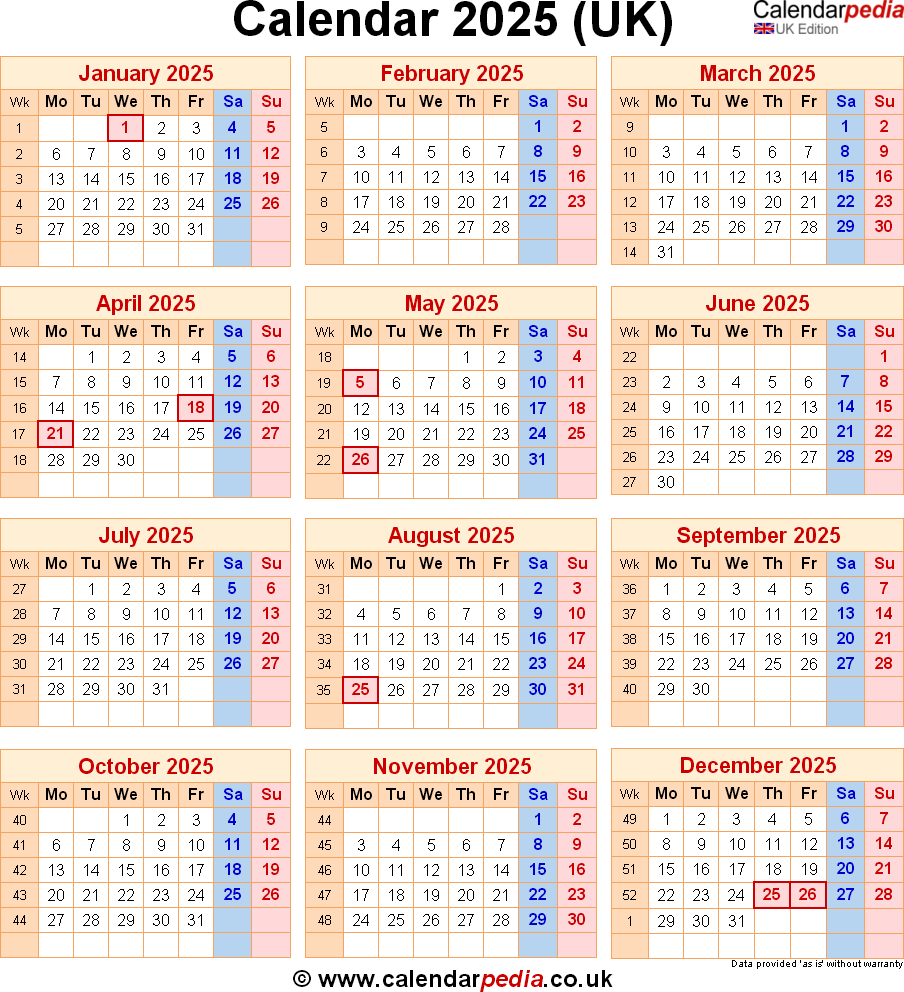
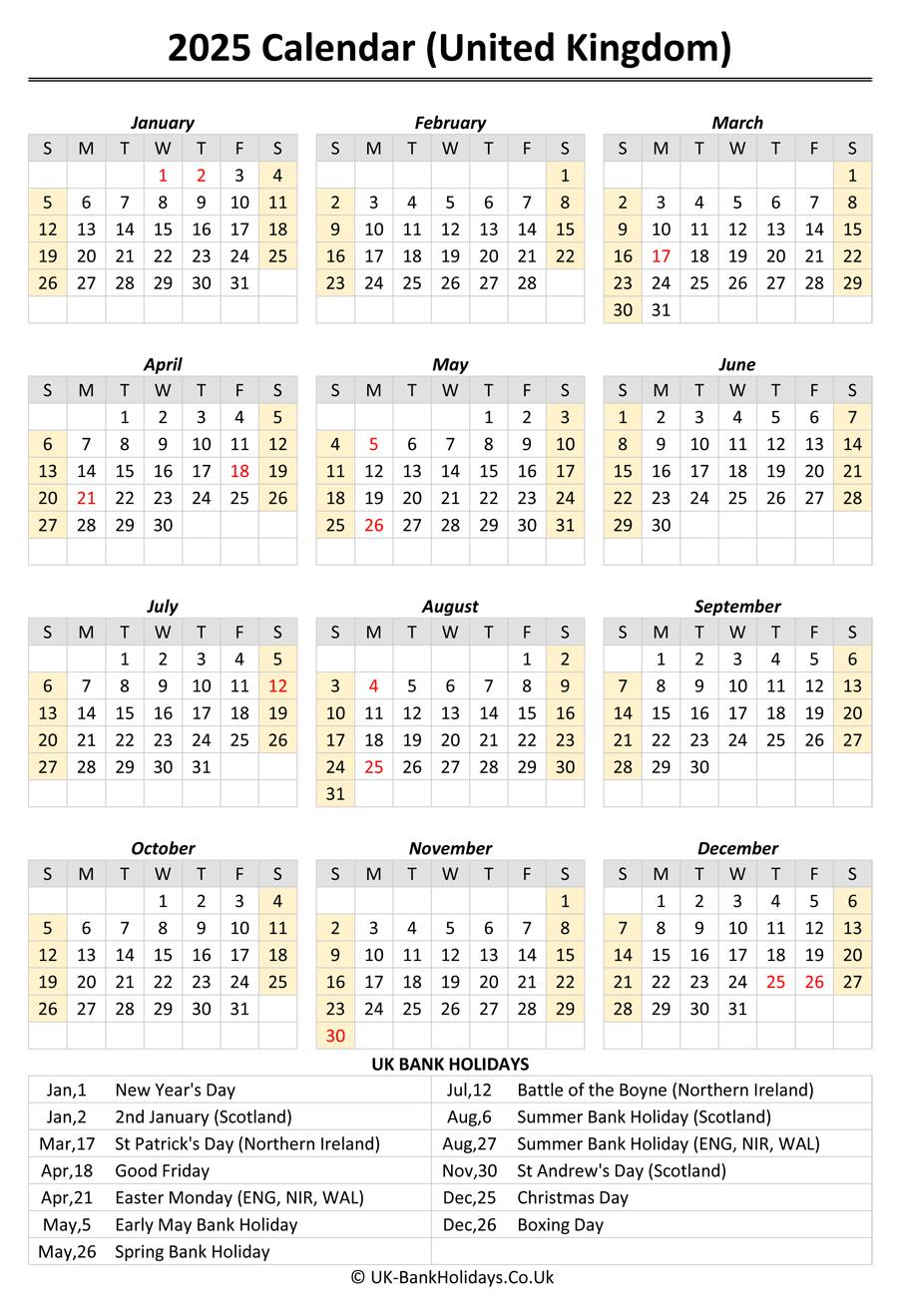


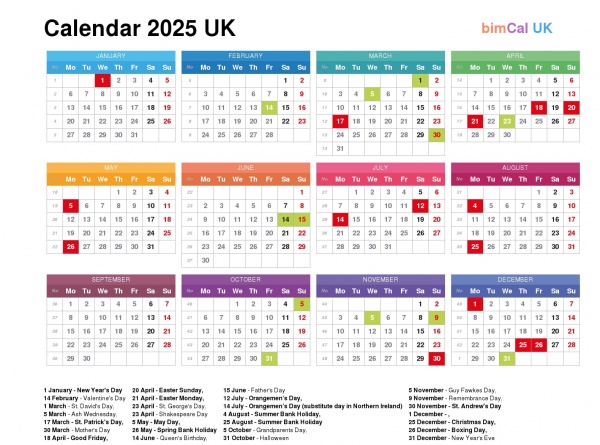
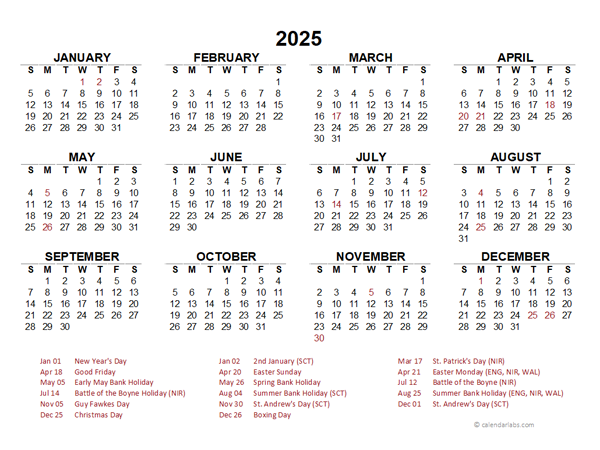
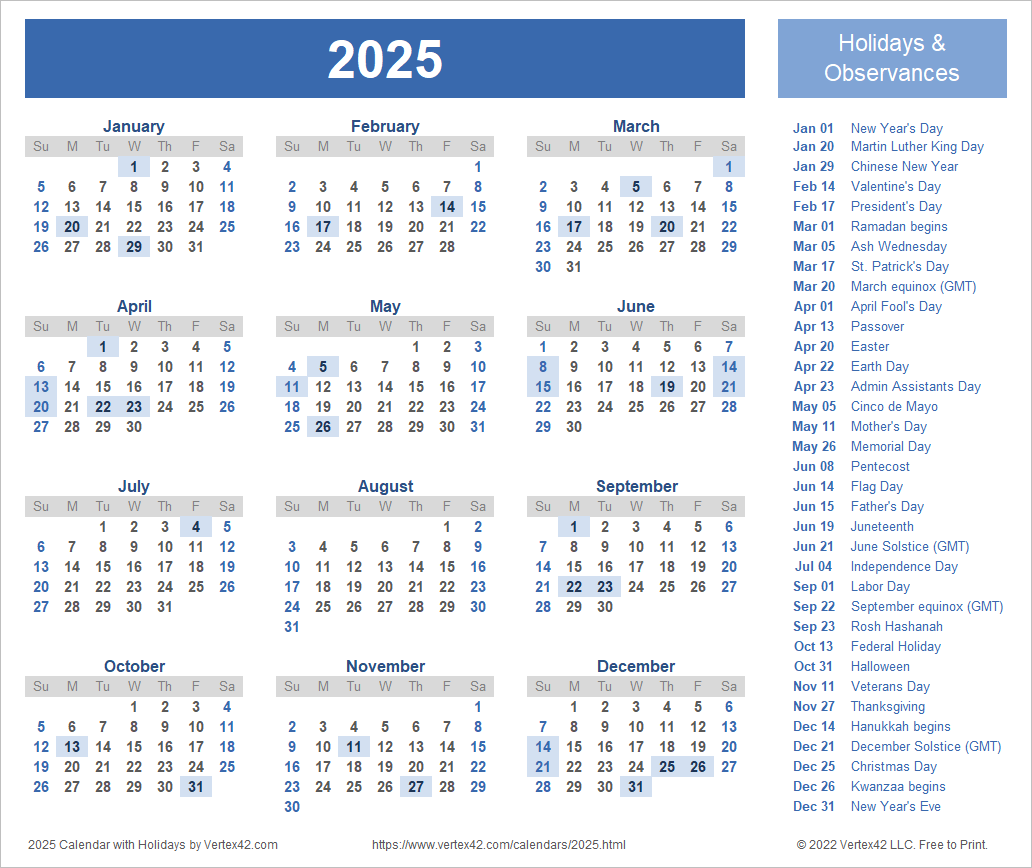
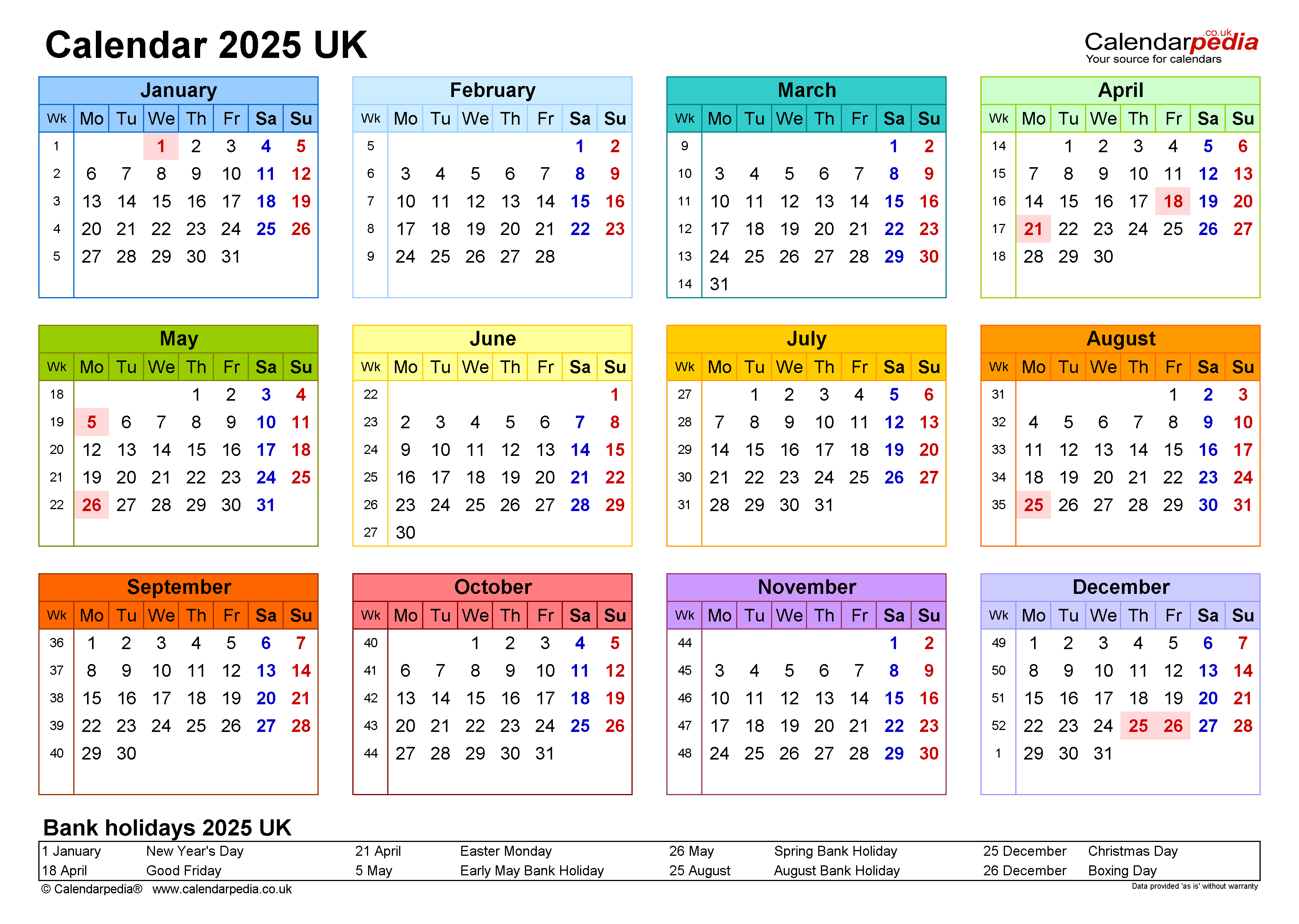
Closure
Thus, we hope this article has provided valuable insights into UK Calendar 2025: A Comprehensive Guide to Holidays and Observances. We appreciate your attention to our article. See you in our next article!